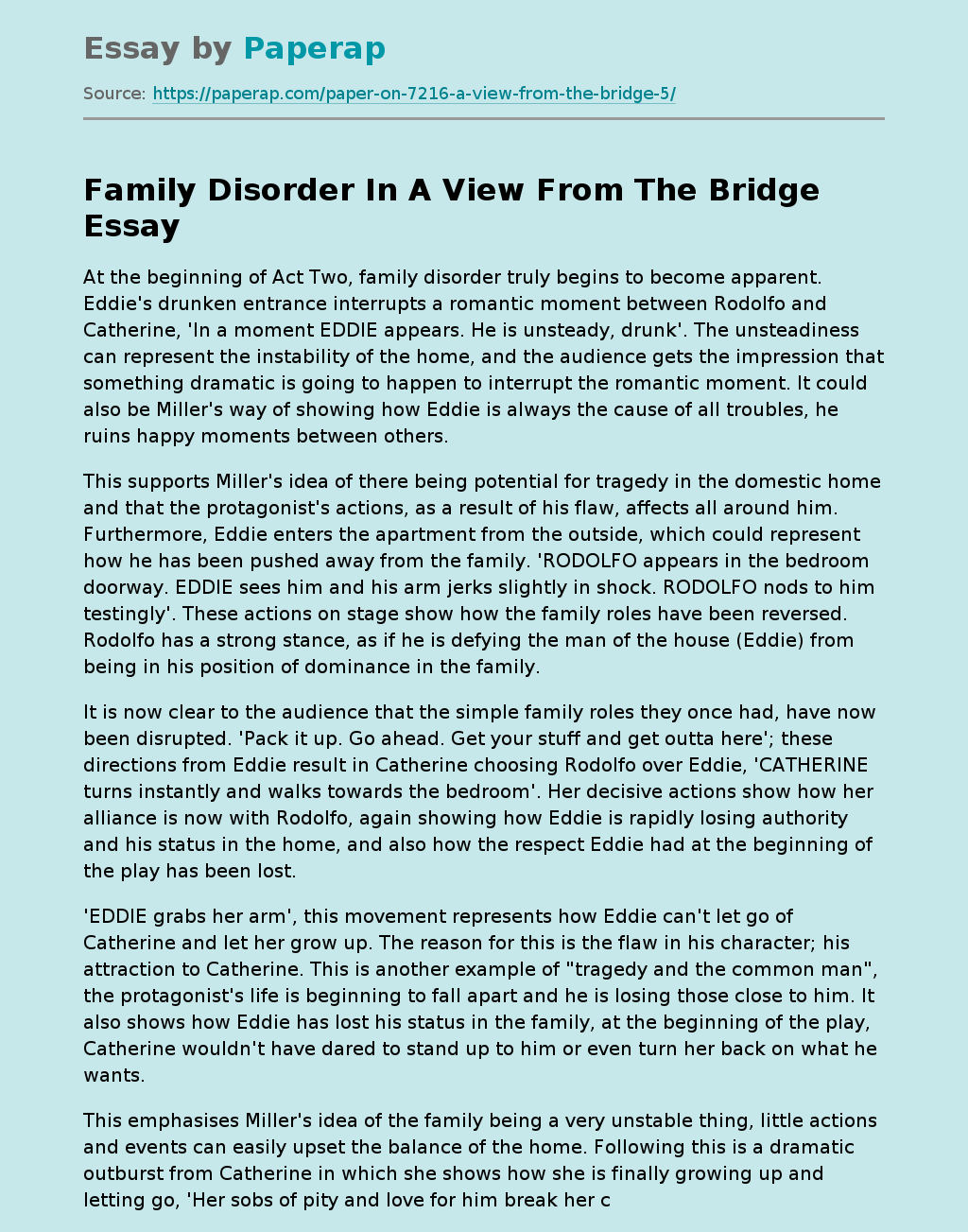“View From the Bridge” - Play by Playwright Arthur Miller
At the beginning of Act Two, family disorder truly begins to become apparent. Eddie’s drunken entrance interrupts a romantic moment between Rodolfo and Catherine, ‘In a moment EDDIE appears. He is unsteady, drunk’. The unsteadiness can represent the instability of the home, and the audience gets the impression that something dramatic is going to happen to interrupt the romantic moment. It could also be Miller’s way of showing how Eddie is always the cause of all troubles, he ruins happy moments between others.
This supports Miller’s idea of there being potential for tragedy in the domestic home and that the protagonist’s actions, as a result of his flaw, affects all around him. Furthermore, Eddie enters the apartment from the outside, which could represent how he has been pushed away from the family. ‘RODOLFO appears in the bedroom doorway. EDDIE sees him and his arm jerks slightly in shock. RODOLFO nods to him testingly’. These actions on stage show how the family roles have been reversed.
Rodolfo has a strong stance, as if he is defying the man of the house (Eddie) from being in his position of dominance in the family.
It is now clear to the audience that the simple family roles they once had, have now been disrupted. ‘Pack it up. Go ahead. Get your stuff and get outta here’; these directions from Eddie result in Catherine choosing Rodolfo over Eddie, ‘CATHERINE turns instantly and walks towards the bedroom’. Her decisive actions show how her alliance is now with Rodolfo, again showing how Eddie is rapidly losing authority and his status in the home, and also how the respect Eddie had at the beginning of the play has been lost.
‘EDDIE grabs her arm’, this movement represents how Eddie can’t let go of Catherine and let her grow up. The reason for this is the flaw in his character; his attraction to Catherine. This is another example of “tragedy and the common man”, the protagonist’s life is beginning to fall apart and he is losing those close to him. It also shows how Eddie has lost his status in the family, at the beginning of the play, Catherine wouldn’t have dared to stand up to him or even turn her back on what he wants.
This emphasises Miller’s idea of the family being a very unstable thing, little actions and events can easily upset the balance of the home. Following this is a dramatic outburst from Catherine in which she shows how she is finally growing up and letting go, ‘Her sobs of pity and love for him break her composure’. This evokes emotion in the audience and allows them to empathise both with Eddie and Catherine. Miller’s technique of forcing the audience to feel sorry for Eddie conveys the essence of tragedy, as Eddie is ultimately a victim of his own mind; it is the flaw in him that is rapidly causing his downfall.
‘He reaches out suddenly, draws her to him, and as she strives to free herself he kisses her on the mouth’, Eddie gets so worked up and upset by the situation, that his true feelings finally become exposed. This dramatic climax puts a halt to everything on stage, cutting through Catherine’s outburst. It confirms the suspicions the audience has had all along about Eddie’s feelings for Catherine, and this unexpected event will raise the tension in the audience dramatically. This one desperate act by Eddie truly symbolises the breakdown of the family unit and continues his downfall; there is no going back now.
‘He goes out of the apartment’, Eddie then leaves, as if he has lost his territory completely. During Eddie’s conversation with Alfieri, ‘A phone booth begins to glow on the opposite side of the stage; a faint, lonely blue’. This relates back to the beginning of the play, where we are told that ‘This is not used until the last scenes.. ‘. The appearance of the phone booth now is somewhat ominous, showing how the outside world is going to become involved in this family dishevelment.
It also suggests that the family breakdown is soon going to reach a climax; a desperate act will take place that may change lives. The telephone booth is a ‘lonely blue’, which could represent how Eddie will be lonely after doing what he wants to do. ‘Eddie has at the same time appeared beside the phone’, tension in the audience is high, as we are willing Eddie not to betray his family even more, but we are powerless to do so. After Eddie’s betrayal of the cousins, ‘Beatrice is taking down Christmas decorations and putting them in a box’.
This highlights how the typical family we knew at the beginning is now no more. The action can represent the end of childhood for Catherine, she is now being forced to grow up; and also the total breakdown of the family unit. It is as if the once happy Carbone family has now been put away into a box. A View from the Bridge presents the family as an unstable unit that can easily succumb to change. The change here is caused by the protagonist, Eddie, whose faults lie both in liking his niece Catherine, and his ability to ‘allow himself to be purely known’.
Eddie stood up for what he believed in and didn’t make compromises, which in turn led to his downfall. His family was affected directly here, the balance of things was upset. Miller explored how tragedy is not just an event that occurs in kingdoms and important dwellings, but how it can easily take place within a normal Italian immigrant family. “tragedy and the common man” also accounts for “tragedy and the common family” and the audience are shown how there is great potential for tragedy within the domestic home.
“View From the Bridge” - Play by Playwright Arthur Miller. (2017, Oct 20). Retrieved from https://paperap.com/paper-on-7216-a-view-from-the-bridge-5/

